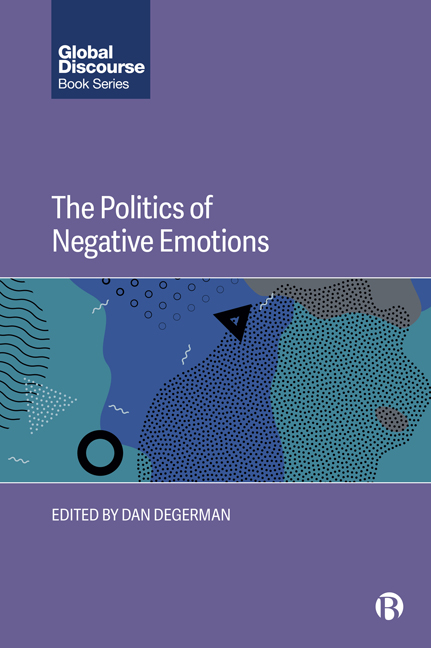Book contents
- Frontmatter
- Contents
- List of Figures
- Notes on Contributors
- Introduction: Feeling Our Way through Politics
- 1 Anger, Fast and Slow: Mediations of Justice and Violence in the Age of Populism
- 2 ‘We Will March Side by Side and Demand a Bigger Table’: Anger as Dignity Claim
- 3 Moving between Frustration and Anger
- 4 The Resentment– Ressentiment Complex: A Critique of Liberal Discourse
- 5 Green Shame: The Next Moral Revolution?
- 6 Against Comfort: Political Implications of Evading Discomfort
- 7 For Love and for Life: Emotional Dynamics at the World Congress of Families
- 8 The Functionality of Affects: Conceptualising Far-Right Populist Politics beyond Negative Emotions
- 9 Moral Economies of Exclusion: Politics of Fear through Antagonistic Anonymity
- 10 Contesting the Politics of Negative Emotions in Educational Policy Making: A Ban on Asylum Seekers’ School Visits in Finland
- Index
7 - For Love and for Life: Emotional Dynamics at the World Congress of Families
Published online by Cambridge University Press: 18 January 2024
- Frontmatter
- Contents
- List of Figures
- Notes on Contributors
- Introduction: Feeling Our Way through Politics
- 1 Anger, Fast and Slow: Mediations of Justice and Violence in the Age of Populism
- 2 ‘We Will March Side by Side and Demand a Bigger Table’: Anger as Dignity Claim
- 3 Moving between Frustration and Anger
- 4 The Resentment– Ressentiment Complex: A Critique of Liberal Discourse
- 5 Green Shame: The Next Moral Revolution?
- 6 Against Comfort: Political Implications of Evading Discomfort
- 7 For Love and for Life: Emotional Dynamics at the World Congress of Families
- 8 The Functionality of Affects: Conceptualising Far-Right Populist Politics beyond Negative Emotions
- 9 Moral Economies of Exclusion: Politics of Fear through Antagonistic Anonymity
- 10 Contesting the Politics of Negative Emotions in Educational Policy Making: A Ban on Asylum Seekers’ School Visits in Finland
- Index
Summary
Introduction
In March 2019, the World Congress of Families (WCF) held its 13th international conference in a palace in Verona, a city with the marketing slogan ‘the city of love’. This location of the congress was no coincidence. Besides being the setting of Shakespeare's play Romeo and Juliet, Verona is also known for political conservatism and close links to ultra-Catholic and far-right movements (Friedman, 2018). The WCF has been defined as a hate group by Southern Poverty Law Center and the Verona congress was largely described in the media as a meeting of ‘haters’ with a ‘medieval agenda’ (Balleck, 2019: 385– 7). The Verona setting enabled the participants and speakers to counter such accusations by drawing on the city's symbolism when presenting themselves instead as defenders of (heterosexual) love and married life. The love theme was widely referred to in speeches, on banners and in the music played at the congress, and it was clearly important to the collective identity and self-presentation of this gathering. However, its definition of love was strongly questioned by the opponents. Tens of thousands of feminists from several countries gathered in Verona to protest against the conservative values and anti-feminist policies proposed by the WCF (some wearing red robes and white bonnets like the oppressed women in the dystopian world of The Handmaid's Tale) and the event was widely covered in the media. The congress lasted for three days, consisted of speeches and seminars, and ended with a ‘Verona Declaration’ and a popular ‘March for the family’ attracting a few thousand participants. The WCF serves as an umbrella for interconnected organisations that promote Christian conservative values internationally. It gathers conservative and religious NGOs, politicians, and scholars who work together on ‘pro-family’ issues, and against a perceived ‘global liberal agenda’ that promotes abortion and birth control, female emancipation, gender theory, and sex education in schools. The near-annual congress was initiated in 1997 by the US-based Howard Center for Family, Religion and Society and the International Organization for the Family (IOF), with key sponsors from the US evangelical, Catholic and Mormon right, and with support from a growing list of political allies in different parts of the world, including in Europe. In Italy the congress was co-sponsored by, among others, the municipality of Verona, and organisers also included pro-life and conservative groups from Italy and Russia.
- Type
- Chapter
- Information
- The Politics of Negative Emotions , pp. 135 - 155Publisher: Bristol University PressPrint publication year: 2023

